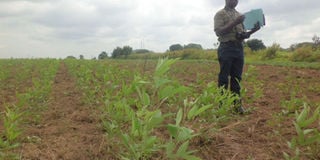Scientists package nitrogen-fixing bacteria to boost fertiliser use in Uganda

Rhizobia is got from the root nodules of nitrogen fixing crops like green gram and multiplied in the laboratory for further distribution to farmers in different parts of the country. Photo by Lominda Afedraru.
What you need to know:
Fertiliser use is very low in Uganda, far below the recommended rate. Scientists are seeking ways to encourage its use among farmers.
Declining soil fertility and high fertiliser cost are major limitations to crop production in smallholder farms in Africa, including Uganda. Intensification of agriculture coupled with reduction in farm sizes leads to the need for farmers to apply fertiliser especially nitrogen, which is essential for plant growth.
Scientists at School of Agriculture and Environmental Sciences, Makerere University, are promoting the use of rhizobia as a nitrogen fixation means to increase productivity on farms.
Nitrogen fixation occurs in nodules on the roots of legume and cereal crops. It is a symbiotic process between the plant and bacteria found in the root nodules called rhizobia.
For nitrogen fixation to occur, rhizobial strains must be present which not only invade the roots and form nodules, but can also fix nitrogen in these nodules.
Dr John Steven Waswa says scientists have been producing rhizobia which is sold to farmers to improve soil nutrients with nitrogen for better production.
Policy issue
What the team does is collect plants that nodulate massively especially the legume crops such as groundnuts, bean species including cowpea and green grams, extract the nodules, multiply them in the laboratory, and dry them. They are packaged and ready for use.
To keep the product safe, they are stored under a regulated temperature, where there is not too much cold and heat. And it is made on order.
“It is mostly purchased by NGOs in bulk and distributed to farmers in areas where they operate. We have also supplied to farmers in Western Kenya and Rwanda. We sell each packet at Shs3,000 which is enough for one acre of land,” he said.
Farmers should put the seeds in a bucket and mix the packed rhizobia in dissolved sugar solution. Thereafter, dress the seed with the mixture ready for planting.
The team has trained farmers in Tororo, Iganga, Mubende and Luweero districts in this method of using the product. NGOs like Vedco and Africa 2000 Network are the key suppliers and this project has been ongoing for about 15 years.
On a wider scale, it is a policy issue to internalise how farmers can make use of fertiliser for sustainable agriculture.
Komayombi Bulegeya, commissioner for crop protection, Ministry of Agriculture, Animal Industry and Fisheries, explains:
“For long, we have been using the fertile soils without reclaiming the nutrients. Statistics show about 87 per cent of soil nutrients are lost every year through soil erosion and other ways that degrade the environment. Our farmers use less than 1kg of fertiliser per hectare per year, which is far below the recommended 9kg. This means there is need to promote fertiliser use among small scale farmers for better output.”
Added advantage
Therefore, adding nutrients like nitrogen, phosphorous and potassium, among others, to the soils boosts fertility for food production to meet the needs of a growing population.
Most farmers use natural fertilisers like manure, which is not enough to improve the soil nutrient but additional amounts of synthetic fertiliser would be an added advantage.
Also, plants take in about 15 nutrients but emphasis is put on nitrogen, which is major nutrient to plants including cereal crops.
Sustainable
The general view by scientists globally working on the issue of improving soil nutrients for sustainable agriculture is that requirements for nitrogen exceed any other major nutrients and rarely does the soil have enough to produce high sustainable yields.
Reduced dependence on nitrogen fertiliser and adopting farming practices that favour nitrogen fixation will benefit both agriculture and the environment in countries, where there is a lot of fertiliser application.
For them, there are several options that are available to manage nitrogen in farmer’s fields and chemical fertilisers are often considered an immediate answer to nutrient deficiencies in soil.




